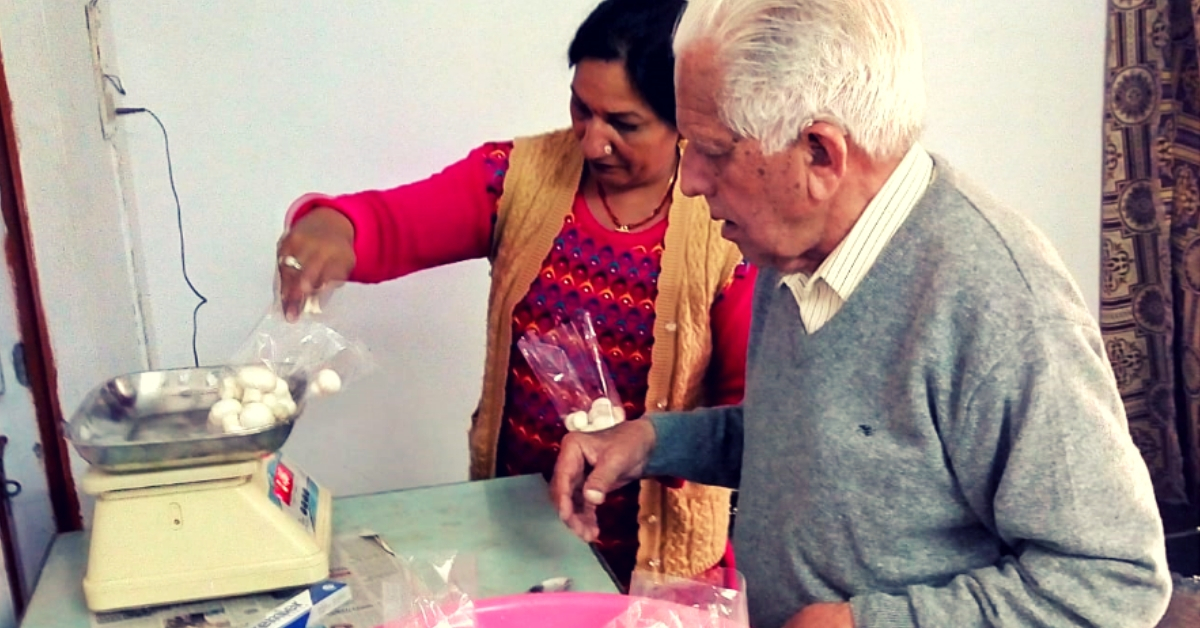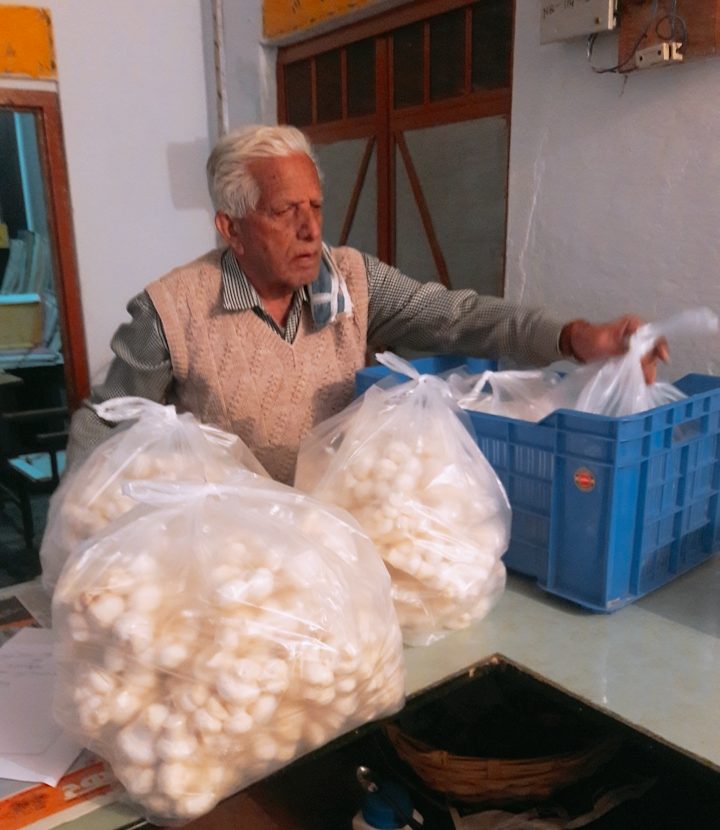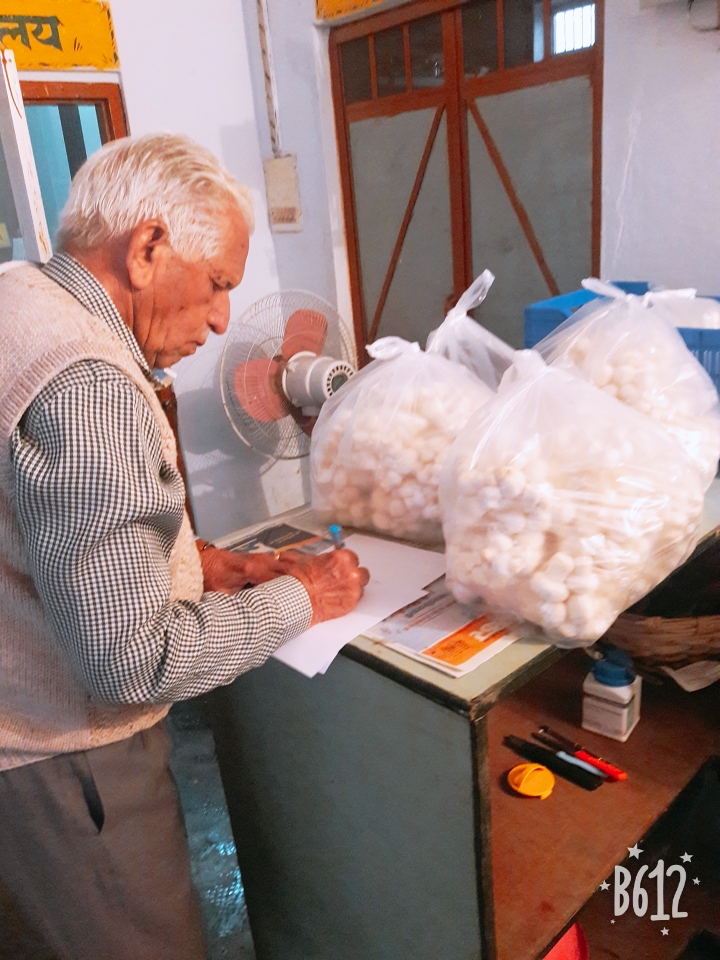At 91, This Army Veteran Turned to Mushroom Farming. The Reason Will Move You!
He kickstarted the venture in September 2018, and after grappling with a few initial losses, is finally beginning to make profits.

He is 91-years-old but retired Honorary Army Captain Lekh Raj Sharma is driven by an unparalleled passion that many a youth may find difficult to replicate.
Every week, he travels four hours one way from Chandigarh to his native village of Nari in Himachal Pradesh’s Una district.
Why?
To spend three days a week overlooking mushroom cultivation in a large enclosed hall at Vikas Sadan.
As a band of women rushes through the chores of watering the fruit-bearing fungi, monitoring their growth and plucking, he assists them in packing the newly-reaped button mushrooms in 200 g packets.
You may read this and wonder why an elderly army veteran exerts himself to the labour of farming. Most people who knew him did.

In an exclusive interview with The Better India, Lekh Raj Sharma says, “It isn’t for profit. But to create a sustainable model that, in the long run, can give a dignified means of livelihood to these women.”
Who are these women? And how did this journey begin?
The Better India finds out.
Life in undivided India
He was born on 3 January 1928 in undivided India in the village of Nari in Una district of Himachal Pradesh. He then moved to Hafizabad (present-day Pakistan) after class five to continue school. A few years later, he returned to Una.
“Back in the day, finding employment was no easy task. So when I returned to my village, I began farming. It did help to make ends meet, but I wasn’t satisfied. And so, at 17, I decided to join the army. The second world war was nearing its end, and the army was recruiting youth. Everybody around me tried to dissuade me saying, ‘You are asking for a death wish.’”
He continues, “My response to that was that if a man is to die, he will die regardless of whether he is within the safe walls of his home or fighting a war at the border. And whoever has to live, will live regardless.”
Perhaps it is this approach and determination towards life that drove him to take up new challenges even as he makes a run for a century!
He moved on to serve in the education department of the army for 32 years. This also meant that he retired at a relatively young age of 49.
The pension came but his will to continue working pushed him to work in the administrative department of Chandigarh’s DAV College for another seven years.
“When I retired from there, I realised that I did not want to wait for life to pass me by without doing anything productive. So I channelised my time and energy to set up an NGO, Energy Environment Group, in my ancestral village. Over the years, we worked on issues related to hospital waste management and giving remote villages access to technology like water seal toilets, compost tanks, solar cookers, and biogas plants.”
As time passed, the projects became fewer. Once he turned 90, Sharma felt he couldn’t dedicate as much time and energy to keep the initiatives running.
But one thing he knew was that the shutting down of the NGO would mean no livelihood for his staff, especially the four women whose families depended on it.
Further discussions shed light on how they couldn’t leave the village and go to cities for employment. So, he had to find an avenue that would give them a sustained source of livelihood in the village.
“I decided to take up mushroom cultivation because I knew that it was a crop which could be grown and packaged within the home,” says Sharma.
He kickstarted the venture in September 2018, and after a few initial struggles, is finally beginning to make profits.

He began the cultivation in two lots by procuring 500 bags of ready-to-grow button mushrooms. The grow bags are watered, and the temperature within the room is regulated to ensure the growth. The team makes a special effort to ensure that the mushrooms are not chemically whitened for visual appeal, unlike much of the produce in the market.
After fruiting once in the kit, when regularly watered, these mushrooms grow in multiple flushes.
It takes anywhere between a few weeks to two months for button mushrooms to grow. Further, each of the bags gives nearly 1.5-2 kg button mushrooms, so 500 bags would produce about 1,000 kg or 1 tonne mushrooms.
The wedding season gets them a good business, where the average price that the 200 g packets fetch is between Rs 20-25. This number can even crash to Rs 14 during the off-season, but for the first time this season, Sharma is confident that he will not only break even but earn additional profits.
Speaking about the challenges, he says, “When I started, many people warned me. I knew there would be initial losses, but my mission was to create a replicable model that can help farmers get better incomes and crop prices, since many of them are pulling out of the fields due to losses.”
He adds how one of the major problems that producer-farmers face is the middlemen culture, where intermediaries buy their produce at lower rates and sell it to consumers at a much higher rate.
“This takes away a big chunk of their money. But now, it is time for farmers to reach the market and its consumers directly. This is my focus now, apart from moving to organic cultivation,” says Sharma.
You May Also Like: Working for 35 Years, Ex-Banker Grows Lush 2 Acre Forest in the Middle of Kochi!
He has inspired many villagers to set up a wider system, include other diverse crops and ensure a better price for their produce.

With the harvest season ending in April, his plans for the next season are set. Skipping summers since it would require additional infrastructure costs for air conditioners, he will attempt the challenge of growing mushrooms during the monsoon with the doubled target of 1,000 units of grow bags.
To make the initiative economically sustainable, he is also exploring avenues to collaborate with like-minded farmers for a farming cooperative.
Running into his 92nd year, he has no plans of hanging up his boots anytime soon. He quips, “If I sit at home and do nothing to impact someone else’s life, how will I reach 100?”
This passion towards social welfare runs through his sons Devinder Sharma and Sudhirendar Sharma as well. Devinder has been a well-known agriculture and food policy analyst for over two decades. For nearly ten years, he worked as an agriculture correspondent, traded his plush job to bring together farmer leaders, wrote columns, delivered lectures and voiced their grievances on bigger platforms. Sudhirendar is a water expert, who gave up his comfortable life to work for crucial environmental issues.
Initially, Sharma was a little sceptical about the difficult choices his sons made, but today, he could not be more proud.
Devinder shares, “My father is my inspiration. At an age when most people would chant prayers, he is working towards providing a better life to those who need it the most. He is approaching 92, but he won’t give up. When I ask him why, he says, ‘I am a soldier. A soldier cannot die in bed, he must go on.’”
It reminds Devinder of the Shakespearean quote that his father often recited to him as a child.
“Cowards die many times before their deaths, the valiant never taste of death but once.”
Devinder adds, “He is retired. He is getting his pension. He can live comfortably. But he doesn’t. That, to me, is empowering.”
As he signs off, he reminds us, “There are about 5,910 voters in Punjab and 5,916 in Haryana who have crossed the age of hundred. Did you know Haryana has over 89,000 senior citizens between 90-99? And yet, we never hear about them. My father is a voice for them. One that proves that you are never too old to spark a change.”
We couldn’t agree more.
If this story inspired you, get in touch with Lekh Raj Sharma through his son Devinder Sharma at [email protected].
(Edited by Shruti Singhal)
Like this story? Or have something to share?
Write to us: [email protected]
Connect with us on Facebook and Twitter.
If you found our stories insightful, informative, or even just enjoyable, we invite you to consider making a voluntary payment to support the work we do at The Better India. Your contribution helps us continue producing quality content that educates, inspires, and drives positive change.
Choose one of the payment options below for your contribution-
By paying for the stories you value, you directly contribute to sustaining our efforts focused on making a difference in the world. Together, let’s ensure that impactful stories continue to be told and shared, enriching lives and communities alike.
Thank you for your support. Here are some frequently asked questions you might find helpful to know why you are contributing?


This story made me
-
97
-
121
-
89
-
167











